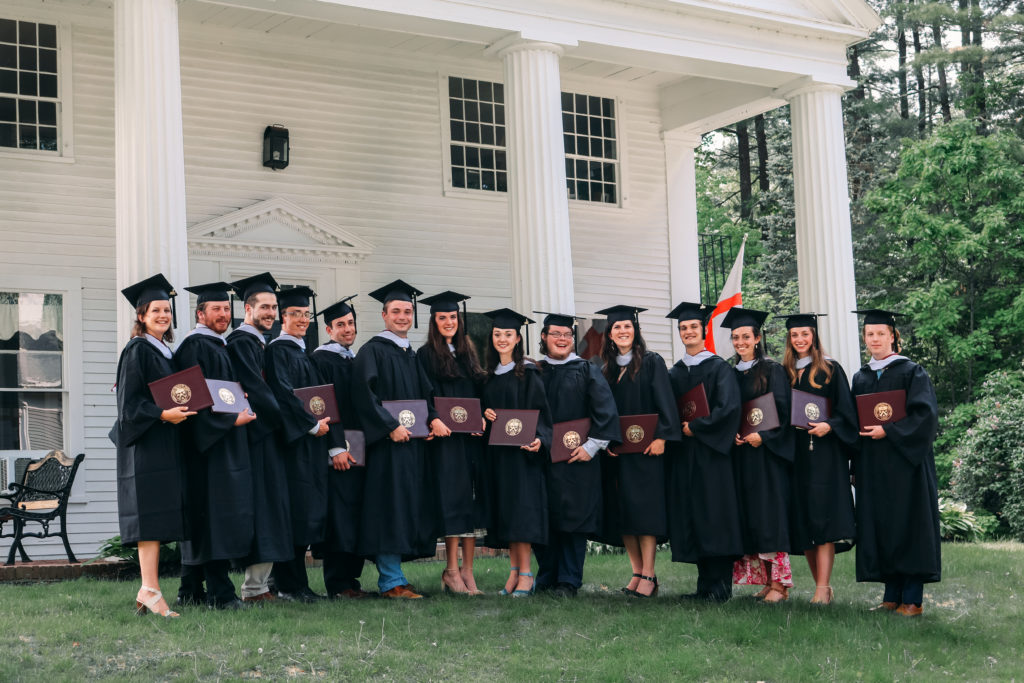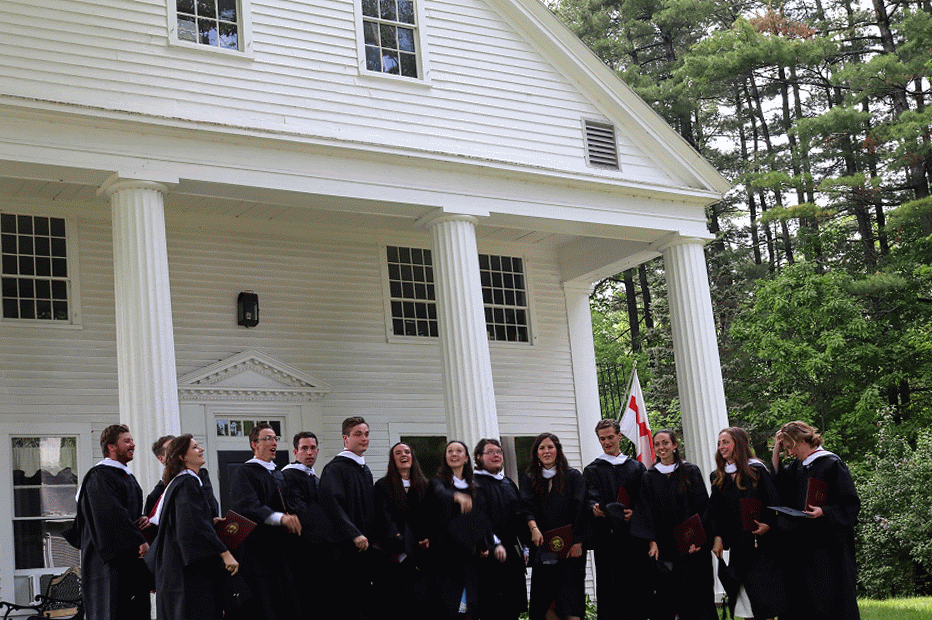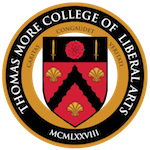With hearts full of gratitude, the Thomas More College community was delighted to experience an in-person commencement Mass and graduation ceremony for the Class of 2021 on Saturday, May 22.
The Most Reverend James Sean Wall, Bishop of Gallup, New Mexico, celebrated the Holy Sacrifice of the Mass for the graduates and their families, with sacred music provided by the TMC students under the direction of Miss Bernadette Lloyd, ’23. Following Mass and a festive luncheon, President William Fahey conferred Honorary Doctorates on both Bishop Wall and Dr. Robert Royal, who served as the Inaugural St. John Henry Newman Chair in Catholic Studies at the College during the past academic year.
After the conferral of the Bachelor of Arts degrees on the graduating seniors, Dr. Robert Royal delivered the Commencement Address, followed by President Fahey’s traditional “Charge” to the Class of 2021, urging them to continue their life-long encounter with the Truth.
Jack Monbouquette, Thomas More College Class of 2020, also was present to receive his degree on behalf of his classmates, who were unable to have an official graduation ceremony last year because of the pandemic.
In his homily, Bishop Wall spoke about the four pillars of the New Evangelization, so beautifully expressed by Pope St. John Paul II in Ecclesia in America: an encounter with the living Christ; conversion; communion; and solidarity. The Bishop drew on his vast experience ministering to those whom St. Teresa of Calcutta—who visited his diocese, one of the poorest in the country, twice—called “the poorest of the poor.” He spoke of the intimate connection between the Eucharist and service to the poor. “Whenever St. Teresa founded a home,” he noted, “the very first thing she did was to make sure that the Blessed Sacrament was present, and that her sisters spent time before the Blessed Sacrament.” We similarly should spend time encountering the Living Christ in the Eucharist, the Bishop advised, so that when we see the face of the poor, we see the Face of Christ.

“An intimate and deeper communion with our loving God will draw us into a deeper communion with our brothers and sisters,” said Bishop Wall. He cited Pope Emeritus Benedict VXI, who reminds us that “an expression of a love for our neighbor is an expression of our love for God.” The Bishop then asked: Who are the poorest of the poor? Who are those in greatest need? “The ones who are most vulnerable,” he responded: “the poor defenseless little children in the womb.”
“Unfortunately,” he added, “a woman’s womb has turned into a political battleground. If we truly want to live out our baptismal call, it means we really have to practice solidarity, especially in relationship to that defenseless little child in the womb. We must be the voice for the voiceless.”
In introducing Bishop Wall, Dr. Fahey praised him for being that voice for the voiceless, and for his “pastoral conviction” in defending innocent human life. “With great seriousness, Bishop Wall addresses the fact that abortion has been and remains the great evil of our culture.” In a recent article published in First Things, the Bishop defends the proper use of what he calls ‘the last remaining and most severe medicinal option we have: eucharistic sanctions’ for persistently wayward Catholic politicians who support the culture of death. “This, the good bishop recognizes, has the potential for division and is likely to lessen influence and even support for the Church,” notes Dr. Fahey. “But as he states in his concluding paragraph: Our Lord ‘was not interested in numbers, but in the salvation of souls.’”
In awarding Dr. Robert Royal the Honorary Doctorate, President Fahey noted that throughout his past year of teaching and advising students, Dr. Royal has, “as St. John Henry Newman says a friend should, helped us by ‘writing and word’ to know ourselves a little better, to know what we did not know, to better read and better understand the wants and feelings of Man, to take comfort in good reading, and especially to think of the higher life and brighter world that is above this one. For that,” he said, “we are grateful.”
Robert Royal’s commencement address, which he published in full on his popular website, The Catholic Thing, discussed both the problems and possibilities the challenges of the past year have revealed. He began by praising the namesake of his endowed Chair, who has been a lifelong influence: “I’ve spent this academic year as the inaugural St. John Henry Newman Visiting Chair in Catholic Studies at this College,” he said. “I’d urge each of you to stay close to Newman all your lives because of his brilliance, wisdom, and holiness.”
Dr. Royal also spoke of the “ferocity of ‘woke’ moralism,” and cautioned students not to respond in kind, not to practice a “reverse cancel culture,” but instead to devote their efforts to building up the culture. “People may tell you that now you’ll be entering the ‘real world.’” But, he noted, “you’ve already been in ‘the real world’ these past four years—the real world of young adults asking the fundamental questions that confront every human being born into the world.”

“That world,” said Dr. Royal, “desperately needs people with minds, hearts, souls formed, as yours have been, by engagement with figures over millennia of human history who themselves had great minds, hearts, and souls.” He reminded the graduates that their education has given them “a valuable perspective on whatever other parts of the ‘real world’’ they will now enter.
“Francis of Assisi used to say to the early friars, ‘Let us begin again, for as yet we have done nothing.’” said Dr. Royal. “He knew that every day is a Day of Commencement. That under God, we can always know more, do more, be more. . . . Those of us who live every day as Commencement Day will never lack for meaning and purpose and exciting vistas spread out before us.”
President Fahey concluded the commencement ceremony with his annual “charge,” or inspirational task, for the graduating class. “Nemo dat quod non habet—No can give something he does not possess,” he told the students. “Your mind is not a zip drive into which ideas and skills were, to use that great technical verb, ‘dumped.’ We have not treated it as such; you have not developed as such.”
“You leave the College with as much as you allowed your mind and your heart to receive. And any College marked by teachers who could not give her students what they themselves had learned—perhaps because they themselves had nothing to give—would be not a College, but a School of Illusions. And, any College which boasted teachers who bade farewell to her students after injecting into their hearts and minds the notion that they now knew all the answers would be a School of Pride.” Rather than a School of Illusions or a School of Pride, Dr. Fahey suggested that Thomas More College has a faculty who have striven to transmit to the students the Truth which they themselves have so gratefully received.
President Fahey ended with a brief reflection on the most famous work of the College’s patron, St. Thomas More’s Utopia. “Many questions about the nature of man and society are raised both indirectly and provocatively by the strange vision of Utopia. But how does the book end? It ends with Thomas More taking Raphael Hythloday’s hand in friendship, and going away to a meal, with many things left unanswered, many questions pressing down, and More expressing with honesty that he would be glad to embrace an opportunity to talk and learn further.”
President Fahey expressed the hope that the education received at Thomas More would similarly fill the graduates with this further desire for the truth, a desire to continue the conversation begun over the past four years. “A Catholic education,” he said, “is given so that you may encounter the Truth and know it most fully in the person of Jesus Christ.”
Or, as Robert Royal said in his address: “As all Thomas More College students I’m sure know, the end of your formal instruction cannot, should not, ever be, the end of your journey towards knowledge, virtue, wisdom, and God Himself.”

For further reading:
Thomas More College Announces Commencement Celebrant and Speaker
Dr. Robert Royal Appointed St. John Henry Newman Visiting Chair in Catholic Studies
